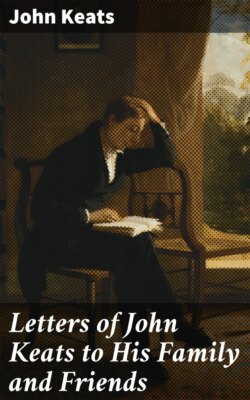Читать книгу Letters of John Keats to His Family and Friends - John Keats - Страница 27
XXIII.—TO JOHN HAMILTON REYNOLDS.
Оглавление[Burford Bridge,] November 22, 1817.
My dear Reynolds—There are two things which tease me here—one of them Cripps, and the other that I cannot go with Tom into Devonshire. However, I hope to do my duty to myself in a week or so; and then I’ll try what I can do for my neighbour—now, is not this virtuous? On returning to Town I’ll damm all Idleness—indeed, in superabundance of employment, I must not be content to run here and there on little two-penny errands, but turn Rakehell, i.e. go a masking, or Bailey will think me just as great a Promise Keeper as he thinks you; for myself I do not, and do not remember above one complaint against you for matter o’ that. Bailey writes so abominable a hand, to give his Letter a fair reading requires a little time: so I had not seen, when I saw you last, his invitation to Oxford at Christmas. I’ll go with you. You know how poorly Rice was. I do not think it was all corporeal—bodily pain was not used to keep him silent. I’ll tell you what; he was hurt at what your Sisters said about his joking with your Mother, he was, soothly to sain. It will all blow over. God knows, my dear Reynolds, I should not talk any sorrow to you—you must have enough vexations—so I won’t any more. If I ever start a rueful subject in a letter to you—blow me! Why don’t you?—now I am going to ask you a very silly Question neither you nor anybody else could answer, under a folio, or at least a Pamphlet—you shall judge—why don’t you, as I do, look unconcerned at what may be called more particularly Heart-vexations? They never surprise me—lord! a man should have the fine point of his soul taken off to become fit for this world.
I like this place very much. There is Hill and Dale and a little River. I went up Box hill this Evening after the Moon—“you a’ seen the Moon”—came down, and wrote some lines. Whenever I am separated from you, and not engaged in a continued Poem, every letter shall bring you a lyric—but I am too anxious for you to enjoy the whole to send you a particle. One of the three books I have with me is Shakspeare’s Poems: I never found so many beauties in the sonnets—they seem to be full of fine things said unintentionally—in the intensity of working out conceits. Is this to be borne? Hark ye!
When lofty trees I see barren of leaves,
Which erst from heat did canopy the head,
And Summer’s green all girded up in sheaves,
Borne on the bier with white and bristly head.
He has left nothing to say about nothing or anything: for look at snails—you know what he says about Snails—you know when he talks about “cockled Snails”—well, in one of these sonnets, he says—the chap slips into—no! I lie! this is in the Venus and Adonis: the simile brought it to my Mind.
As the snail, whose tender horns being hit,
Shrinks back into his shelly cave with pain,
And there all smothered up in shade doth sit,
Long after fearing to put forth again;
So at his bloody view her eyes are fled,
Into the deep dark Cabins of her head.
He overwhelms a genuine Lover of poesy with all manner of abuse, talking about—
“a poet’s rage
And stretched metre of an antique song.”
Which, by the bye, will be a capital motto for my poem, won’t it? He speaks too of “Time’s antique pen”—and “April’s first-born flowers”—and “Death’s eternal cold.”—By the Whim-King! I’ll give you a stanza, because it is not material in connection, and when I wrote it I wanted you—to give your vote, pro or con.—
Crystalline Brother of the belt of Heaven,
Aquarius! to whom King Jove hath given
Two liquid pulse-streams, ’stead of feather’d wings—
Two fan-like fountains—thine illuminings
For Dian play:
Dissolve the frozen purity of air;
Let thy white shoulders, silvery and bare,
Show cold through wat’ry pinions: make more bright
The Star-Queen’s Crescent on her marriage night:
Haste, haste away!
… I see there is an advertisement in the Chronicle to Poets—he is so over-loaded with poems on the “late Princess.” I suppose you do not lack—send me a few—lend me thy hand to laugh a little—send me a little pullet-sperm, a few finch-eggs—and remember me to each of our card-playing Club. When you die you will all be turned into Dice, and be put in pawn with the devil: for cards, they crumple up like anything. …
I rest Your affectionate friend
John Keats.
Give my love to both houses—hinc atque illinc.
